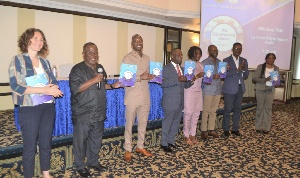- Home - News
- Elections 2024
- News Archive
- Crime & Punishment
- Politics
- Regional
- Editorial
- Health
- Ghanaians Abroad
- Tabloid
- Africa
- Religion
- Photo Archives
- Press Release
General News of Thursday, 29 May 2025
Source: www.ghanawebbers.com
GSS study finds higher bribery rates among men in Ghana
A Ghana Statistical Service (GSS) report shows that bribery is more common among males than females.
It also finds that urban residents face higher bribery rates than those in rural areas.
Mr. Omar Seidu, Head of Social Statistics at GSS, shared key findings from the “Governance Series Wave 1 Report.” He noted that 55.7 percent of people contacted public officials between January and December 2024.
Of those, 18.4 percent admitted to giving gifts, mostly money, for services.
The report identified ten public institutions where bribery is frequent. These include the Police Motor Transport and Traffic Division at 61 percent and Police General Duties at 46.7 percent.
The Police Criminal Investigation Department had a rate of 37.9 percent, while the Traffic Management Authority of City Guard was at 34.4 percent.
Among persons with disabilities, 21.1 percent reported giving gifts. This was higher for those with physical difficulties (40.1 percent) and sight difficulties (32.5 percent).
Regionally, Greater Accra had the highest bribery rate at 22.0 percent, followed by Ashanti at 18.1 percent. In contrast, Savannah recorded only 1.0 percent and North East had 1.1 percent.
The report highlighted governance challenges as well. In 2024, over 70 percent of Ghanaians felt the political system offered little opportunity for engagement in decision-making.
Dr. Alhassan Iddrisu, Government Statistician, emphasized data's role in shaping governance.
He stated that governance should reflect citizens' voices and be driven by solid evidence.
Dr. Nii Moi Thompson from the National Development Planning Commission called the report timely due to ongoing corruption issues threatening growth.
He mentioned that addressing corruption could lead to sustainable development.
Dr. Gloria Sarku Kumawu, Deputy Clerk of Parliament, said the report offers vital feedback on governance lapses.
Dr. Evans Aggrey-Darkoh from the Office of Head of Civil Service stressed that trust in governance improves with positive public perception.
Mr. Samuel Harrison-Cudjoe expressed concern about partisan politics affecting community engagement and decision-making participation.
The report combines data from over 20 public bodies and a nationwide survey conducted from January 2–20, 2025.
This survey reached 7,248 respondents from a total of 15,400 households based on the latest census data from 2021.
Covering January–December 2024, it monitors experiences related to governance focusing on inclusiveness and corruption in public institutions while aligning with Sustainable Development Goal 16.











